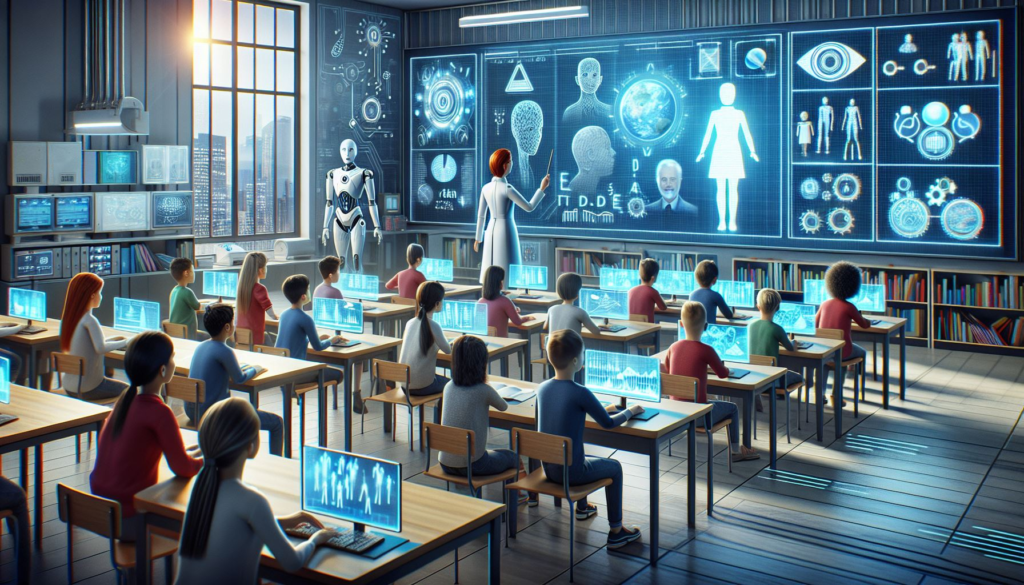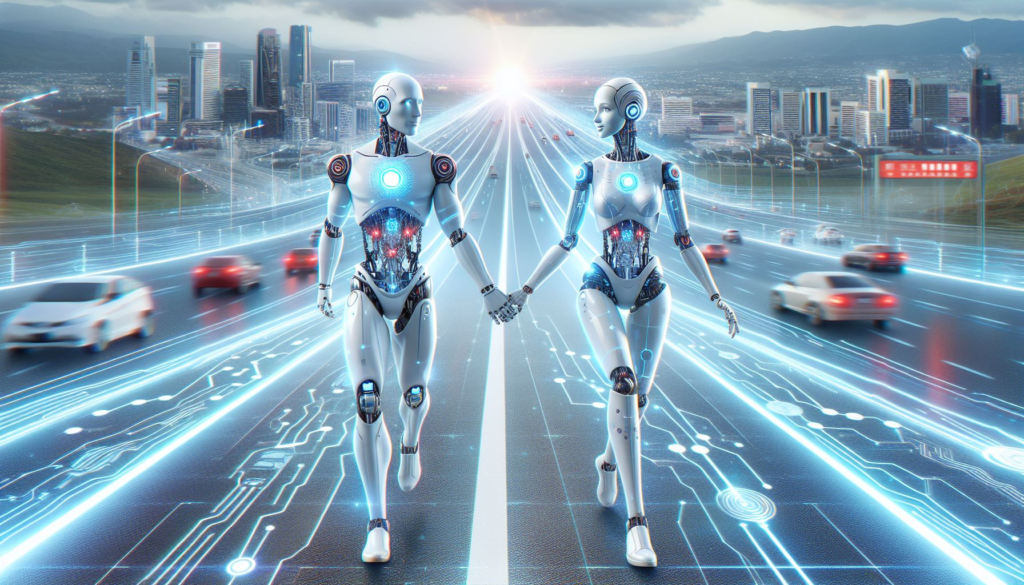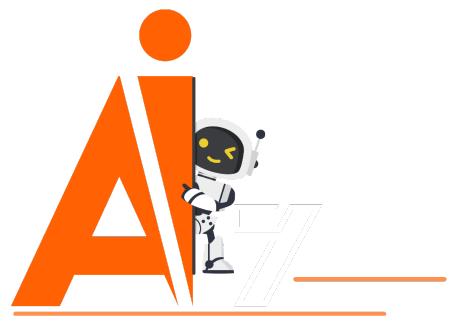AI Career Paths in 2024: Beginner & Intermediate Opportunities
Dive into the world of AI, and you’ll find yourself surfing on the crest of one of the most thrilling waves of technological innovation we’ve seen in decades. This isn’t just about robots taking over mundane tasks; it’s a full-blown revolution reshaping industries, from healthcare to finance and everything in between. The growth of the AI industry is nothing short of spectacular, transforming sci-fi fantasies into everyday realities. With this explosive expansion comes a seismic shift in the job market. New roles are popping up like daisies in the spring, each promising to explore uncharted territories of tech. Imagine jobs where your daily task might involve teaching a machine to understand human emotions or using algorithms to crack the code of life-saving medicines. That’s the kind of future we’re stepping into, folks!
Understanding AI job opportunities isn’t just functional; it’s becoming essential for anyone looking to future-proof their career. Whether you’re just starting on your career journey or looking to pivot into something more dynamic, getting to grips with the AI landscape is akin to holding a map in unexplored territory. It’s not just about securing a job; it’s about unlocking a world of opportunities that could take your career to heights you’ve never imagined. Think of it as your career cheat code. With AI, you’re not just following the trends but riding the wave at the forefront of technological evolution. So, if you’ve ever fantasized about being a pioneer, navigating the AI job market might be your ticket to the adventure of a lifetime. Let’s dive in and discover how your career can thrive in this exciting new world!

Laying the Groundwork: Understanding AI
Step into the Artificial Intelligence (AI) arena, and you’re not just stepping into a field of study; you’re diving into a vast ocean that touches every shore of the technological world. AI, in its essence, is like giving a computer a brain, not just any brain, but one that learns, adapts, and makes decisions. It’s at the heart of revolutionary changes across the globe, powering everything from your smartphone’s virtual assistant to the algorithms suggesting what you should binge-watch next. In today’s tech landscape, AI is the silent force behind innovations transforming industries, securing data, and even saving lives through medical diagnostics. It’s the wizard behind the curtain, making the magic happen in ways we could only dream of a few decades ago.
But here’s where it gets genuinely fascinating: AI isn’t just a playground for the tech-savvy. It’s a crossroads where technology meets business, ethics, psychology, and beyond. Careers in AI are as diverse as they come, blending disciplines in an unprecedented way. You could be an AI developer one day, coding away at the next big app, and an AI ethicist the next, pondering the moral implications of your creation. This interdisciplinary nature means that whether you’re passionate about crunching numbers, crafting policies, or designing user experiences, there’s a place for you in AI. This unique blend of fields makes AI careers incredibly exciting and vital for shaping a future where technology enhances our lives responsibly and ethically. So, if you’re ready to merge your interests and skills in ways you never thought possible, AI might be your perfect match. Let’s embark on this journey together, exploring the endless possibilities AI careers offer!
Here is a list of AI technical jobs that are trending:
Creating a table that outlines beginner AI jobs, along with the necessary learning paths and skill levels, can provide a clear roadmap for those looking to enter the field of artificial intelligence. Here’s a concise guide to get you started on your AI career journey:
| Job Title | Skills to Learn | Skill Level Required |
|---|---|---|
| AI Technician | Basic programming (Python, R), hardware fundamentals, troubleshooting AI systems | Beginner to Intermediate |
| Junior Data Analyst | Data manipulation and analysis (SQL, Excel), basic statistics, visualization tools (Tableau, PowerBI) | Beginner to Intermediate |
| Assistant AI Developer | Programming (Python, Java), understanding of basic AI concepts, software development tools (Git, Docker) | Intermediate |
| AI Support Specialist | Customer service skills, technical troubleshooting, familiarity with AI applications and software | Beginner to Intermediate |
| Data Annotation Specialist | Attention to detail, basic understanding of data structures, familiarity with annotation tools | Beginner |
| Machine Learning Intern | Basic machine learning algorithms, programming (Python), mathematical foundations (linear algebra, calculus) | Intermediate |
| Research Assistant (AI/ML) | Literature review skills, basic programming and data analysis, academic writing | Intermediate |
| AI Content Creator | Strong writing skills, understanding of AI concepts and trends, SEO fundamentals | Beginner to Intermediate |
The provided table is an essential guide for individuals curious about the burgeoning field of Artificial Intelligence (AI) and seeking roles that align with their existing skill sets and areas of interest. It underscores the variety of entry points into the AI domain, highlighting positions ranging from technical support to development roles that necessitate a foundational understanding of AI concepts and programming skills. The emphasis on the diversity of roles available within AI illustrates the field’s inclusivity and potential for career growth, catering to a wide range of professional backgrounds and interests.
This summary reinforces the idea that embarking on a career in AI doesn’t merely involve a linear progression but rather a continuous journey of skill enhancement and specialization. The table suggests that initial roles can significantly contribute to one’s understanding and experience in AI as a crucial stepping stone toward more complex and specialized positions. It underscores the importance of a commitment to ongoing learning and adaptation to the rapidly evolving tech landscape. Whether one starts as a Data Annotation Specialist or an AI Support Specialist, each role offers unique insights and experiences invaluable for career advancement in AI.

AI’s Influence on Non-Technical Careers: A New Paradigm
The table provided earlier elucidates the burgeoning roles that, while not technical in the traditional sense, are indispensably influenced by AI. This encompasses a spectrum of professions, from AI Business Analysts, who bridge the gap between AI capabilities and business objectives, to AI Ethics Officers, who ensure AI technologies’ ethical development and application. Each role delineated in the table encapsulates the essentiality of AI literacy in non-technical domains, showcasing how AI knowledge complements traditional skills to foster innovation, ethical governance, and strategic advancements.
The Evolution of Skill Sets in an AI-Driven World
The intersection of AI with non-technical careers demands a recalibration of skill sets, where understanding AI’s applications and implications becomes as crucial as domain-specific expertise. For instance, AI marketing specialists must now navigate AI-driven analytics tools to devise strategies, while legal advisors on AI require a firm grasp of the legal ramifications of AI technologies. This convergence signifies a shift towards interdisciplinary skill requirements, where the ability to understand and leverage AI effectively can distinguish professionals in their respective fields.

Preparing for the Future: Adaptability and Lifelong Learning
To thrive in the world of AI, professionals in non-technical careers need to be adaptable and constantly learning. AI is constantly changing and impacting how we work. Staying up-to-date through workshops, seminars, and courses will provide valuable skills for working alongside AI.
AI is changing the workplace! Industries are constantly finding new ways to use AI, which means new skills are needed for traditional jobs. Artists can use AI to make new kinds of art, and healthcare workers can use AI to make better decisions. Check out the table below to see how AI is changing different non-technical jobs. You’ll see that success will come from using your existing skills and adding some new AI know-how.
| Job Title | AI Application | Skills Required |
|---|---|---|
| AI Business Analyst | Analyzing business needs and determining how AI can meet them | Analytical thinking, understanding of AI capabilities, communication, and business acumen |
| AI Project Manager | Managing AI projects from conception to implementation | Project management, familiarity with AI project lifecycle, stakeholder management, and agile methodologies |
| AI Ethics Officer | Ensuring AI systems are developed and used ethically | Understanding of ethical AI principles, regulatory knowledge, communication, and critical thinking |
| HR Specialist for AI Talent | Recruiting and managing AI talent | Knowledge of AI skillsets, recruitment strategies, people management, and negotiation |
| AI Marketing Specialist | Leveraging AI for marketing strategies | Marketing principles, understanding of AI-driven marketing tools, creativity, and data analysis |
| Legal Advisor on AI | Advising on legal aspects related to AI | Legal expertise, knowledge of AI and its implications, analytical skills, communication |
| AI Sales Representative | Selling AI products and services | Sales skills, understanding of AI products and their applications, communication, relationship building |
| Customer Success Manager (AI Solutions) | Ensuring customers achieve their desired outcomes using AI products | Customer service, understanding of AI applications in customer contexts, problem-solving, communication |
| AI-Aided Artist | Utilizing AI to create and enhance artwork | Creativity, understanding of AI art tools, visual aesthetics, and adaptability |
| Fashion Designer using AI | Designing clothing using AI predictions and trends | Fashion design, trend analysis using AI, creativity, and understanding of AI design tools |
| Graphic Designer with AI Tools | Creating visual content with AI-enhanced software | Graphic design skills, proficiency with AI-powered design tools, creativity, and visual communication |
| Music Producer using AI | Composing music with AI algorithms | Musical talent, understanding of AI music software, creativity, technical skills in music production |
| Small Business Owner leveraging AI | Implementing AI for business operations, marketing, and customer service | Entrepreneurship, understanding of AI applications for businesses, strategic planning, adaptability |
| Human Resources (HR) Coordinator using AI | Streamlining HR processes with AI (e.g., resume screening) | People management, understanding of AI HR tools, communication, empathy |
| Healthcare Administrator using AI | Optimizing hospital operations and patient care with AI analytics | Healthcare management, understanding of AI in healthcare, data analysis, communication |
| Call Center Manager with AI Systems | Managing AI-driven call center technologies | Customer service management, understanding of AI call center tools, communication, problem-solving |
| Customer Service Rep using AI Chatbots | Assisting in handling customer queries with AI support | Customer service, understanding of AI chatbot interaction, communication, and problem-solving |
The integration of AI across non-technical careers presents both challenges and opportunities. It compels professionals to expand their horizons, blending traditional expertise with new knowledge and skills in AI. By embracing this shift, non-technical professionals can unlock new potential, drive innovation, and play a pivotal role in shaping the AI-enhanced future. The journey into AI is not confined to those with a background in technology; it is a path open to all, promising a future where AI and human ingenuity converge to create unprecedented possibilities.

For Beginners: Where to Start
The journey into AI can still be enriching and rewarding for beginners interested in AI but without the desire to dive into programming. The first step is to understand the importance of AI literacy, which involves building a foundation in AI concepts without necessarily getting into the technicalities of coding. This foundational knowledge is crucial because it enables you to grasp how AI impacts various industries and daily life, from enhancing customer service experiences to driving innovations in healthcare and environmental conservation. Understanding AI’s capabilities, limitations, and ethical considerations is essential for anyone navigating the modern world where AI is increasingly prevalent.
Expanding on the essential skills development for non-programmers in the AI field, we delve deeper into the components that make up this foundational knowledge. This includes understanding AI applications, mastering project management in tech environments, and navigating the ethical use of AI technology. Additionally, we explore how critical thinking, problem-solving, and effective communication play crucial roles in complementing AI literacy. These skills are indispensable for providing valuable insights, leading teams, and ensuring AI solutions’ responsible development and use.
Outline for Beginners
- Understanding AI Applications
- Objective: Gain a broad understanding of how AI is applied across different sectors.
- Key Areas to Explore:
- AI in healthcare (e.g., diagnostic tools, personalized medicine)
- AI in finance (e.g., fraud detection, algorithmic trading)
- AI in customer service (e.g., chatbots, personalized recommendations)
- Resources:
- Online courses: “AI For Everyone” by Andrew Ng on Coursera
- Articles: Case studies on AI applications in reputable tech journals
- Project Management in Tech Environments
- Objective: Learn to manage projects that involve AI technologies effectively.
- Skills to Develop:
- Agile and Scrum methodologies tailored for tech projects
- Coordination between cross-functional teams (technical and non-technical)
- Timeline management, budgeting, and risk assessment in tech projects
- Resources:
- LinkedIn Learning: Courses on Agile Project Management
- Books: “Scrum: The Art of Doing Twice the Work in Half the Time” by Jeff Sutherland
- Ethical Use of AI Technology
- Objective: Understand the ethical considerations in developing and deploying AI.
- Areas of Focus:
- Bias and fairness in AI algorithms
- Privacy concerns and data protection
- Long-term societal impacts of AI
- Resources:
- Webinars: IEEE’s series on Ethical Considerations in AI Projects
- Articles: Publications by the AI Now Institute on ethical AI practices
- Critical Thinking and Problem-Solving
- Objective: Develop the ability to assess AI technologies and their implications critically.
- Approaches:
- Evaluating the limitations and potential of AI applications
- Analyzing case studies of AI successes and failures
- Developing strategies to overcome challenges in AI projects
- Resources:
- Online courses: “Critical Thinking in the Information Age” on FutureLearn
- Podcasts: “AI in Business” for case studies and expert analyses
- Effective Communication
- Objective: Master the art of conveying complex AI concepts to non-technical stakeholders.
- Skills to Enhance:
- Simplifying technical jargon for broader audiences
- Presenting AI projects and their benefits clearly and persuasively
- Writing concise and informative project updates and reports
- Resources:
- Workshops: Communication skills for tech professionals
- Books: “Talk Like TED: The 9 Public-Speaking Secrets of the World’s Top Minds” by Carmine Gallo
Example
Consider a professional working in healthcare management who wishes to leverage AI to improve patient care but needs a programming background. By focusing on understanding AI applications in healthcare, they could identify opportunities for implementing AI diagnostic tools or personalized medicine solutions. They learn to lead a cross-functional team to pilot an AI project through project management courses, addressing budgeting, timeliness, and ethical considerations, such as patient data privacy. Engaging with resources on ethical AI ensures the project adheres to fairness and transparency standards. By developing critical thinking, they evaluate the potential impact of AI on patient outcomes and healthcare efficiency. Practical communication skills enable them to present the project’s value and progress to hospital administrators, securing support and funding.

Conclusion
For those of you stepping into the AI world without a programming background, don’t worry! The AI journey is not just for coders. By focusing on a mix of valuable skills, such as understanding how AI is used, managing projects, thinking about AI ethically, and getting good at critical thinking, problem-solving, and clear communication, you’re setting yourself up for success. A whole world of resources—think online courses, webinars, insightful articles, and engaging books—can help break down AI into bite-sized pieces. This way, you can start unlocking the mysteries of AI, opening doors to exciting career possibilities or personal growth. Remember, everyone has a part to play in the AI revolution. By bringing your unique perspective and skills to the table, you’ll be helping to steer AI towards positive outcomes for all fields, from healthcare to education and beyond.
References and Resources
- Online Courses:
- Coursera’s “AI For Everyone” by Andrew Ng is a fantastic starting point for beginners looking to understand the basics of AI without diving into the deep end of coding.
- edX also offers introductory courses on AI that cater to non-programmers, explaining the concepts in an easy-to-understand manner.
- Webinars and Podcasts:
- The IEEE series on “Ethical Considerations in AI Projects” offers insightful discussions on the importance of ethics in AI.
- “AI in Business” podcast provides real-world examples of AI applications, challenges, and solutions in various industries.
- Articles and Books:
- For a deep dive into AI applications across different sectors, Harvard Business Review articles often explore the impact of AI on business and society.
- “Life 3.0: Being Human in the Age of Artificial Intelligence” by Max Tegmark is an accessible book that discusses the future of AI and its implications for humanity.
By exploring these resources, you’ll gain a solid foundation in AI and be well on your way to contributing to this exciting field, even without a background in programming.

